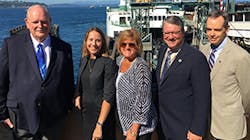U.S. DOT highlights $8.1 million in grants to Washington state agencies to support ferry and bus service in Seattle
A total of $8.1 million in grants from the U.S. Department of Transportation’s Federal Transit Administration (FTA) is coming to the Washington State Department of Transportation (WSDOT) and King County Metro for improvements in transportation in the Seattle area.
The FTA is providing $5.9 million through its Passenger Ferry Grant Program to WSDOT-Washington State Ferries to construct a pedestrian connection between the Seattle Multimodal Terminal at Colman Dock and downtown Seattle. In addition, the FTA is providing $2.2 million through its Low or No Emission (Low-No) Vehicle Program to help King County Metro modernize its bus fleet.
“Residents and visitors to Seattle will benefit from this federal support that will better connect ferry passengers traveling across Puget Sound to downtown Seattle and bring more advanced-technology buses to King County,” said FTA Acting Administrator K. Jane Williams. “We are proud to partner with these agencies to accommodate growing transit ridership and promote economic development in and around the Puget Sound area.”
Williams joined Puget Sound-area transit officials at Colman Dock to announce the grants, including representatives from WSDOT, King County Metro and Kitsap Transit. The ferry grant, only one of nine nationwide the FTA announced earlier this month, will help Washington State Ferries construct an elevated pedestrian connection between the Seattle Multimodal Terminal and downtown Seattle. Washington State Ferries is the largest ferry system in the U.S., carrying 24.6 million passengers per year.
At the event, Williams also highlighted the Low-No grant to King County Metro, which will help the agency buy several battery-electric buses to replace diesel-hybrid buses that have exceeded their useful life. The new, more efficient buses will reduce operating costs and support growing ridership, which topped 103 million trips in 2018.
The Seattle Department of Transportation estimates that close to half of the city’s workforce commutes by transit.
